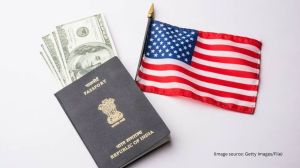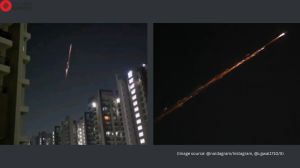`My room rocked like a boat, people were crying, running everywhere’
intro: ANIL SHAH is an artist with the The Indian Express in Ahmedabad. On Thursday, January 25, he set forth on what was possibly the lon...

intro: ANIL SHAH is an artist with the The Indian Express in Ahmedabad. On Thursday, January 25, he set forth on what was possibly the longest weekend vacation of his life, on a trip with his family and friends to Bhuj, the epicentre of the tragedy.
Get up, get out quickly.” My panic-stricken wife’s scream woke me up. I heard an ominous sound, loud and rumbling. The bed began to shake, the windows started rattling and pictures fell off the wall. I tried to get up, but fell. I tried again, fell again. The room was rocking like a boat in rough waters.
Lying on the floor, I couldn’t figure out what was happening. I found myself crawling on all fours like a baby. Amidst the rumbling and the shouts, I crawled towards the stairs. A tall Kathiawadi man — I still don’t know his name — shouted, “Run away, run away.” He stopped, lifted me in his arms and dragged me down the stairs. He placed me in the open space in front of the VRS guesthouse. “Run away. This building is falling,” he shouted.
I stood up and looked around. The rumbling had stopped, the earth wasn’t shaking any more. Only the building I had emerged from was intact: all around was dust and heaps of rubble. The guest houses, girls’ hostels, tourist agencies, houses, shops, eating joints, together, they had made up the little market opposite Bhuj’s main bus stand. They were all gone. Was it a bad dream?
I realised what had happened. I then thought of my family. I saw my children, 10-year-old Tanmay and 7-year-old Dhaval, standing by my side. So were my friend Girish and his wife Veena. I hunted for my wife Naina. There she was, walking down the stairs. “Where were you?” I yelled. After waking me up, she had stayed back to lock the room where our belongings were.
All around, people were in panic, running, crying, shouting. Women were running towards a school nearby where children had assembled for Republic Day. Vehicles were zooming into the distance, God knows where. The vegetable market nearby had collapsed, parts of a cinema hall had fallen off.
An employee emerged from the guesthouse with our belongings and those of the good Samaritan, the Kathiawari. One moment he was standing there all by himself, crying; then he was gone.
Carrying our belongings, we walked to the bus stand to go to Ahmedabad. A crowd had already gathered, and it started swelling with injured people, bleeding profusely and with broken limbs. Somebody said the jail had collapsed, another said a school building near his house had fallen.
The first bus for Ahmedabad was to leave at 1 p.m. As we waited, we chatted up a transport department employee. As luck would have it, he turned out to be from my wife’s village. The Surajbari bridge, which connects Kutch to Saurashtra, was damaged, he said, but he would take us by another route. By the time the bus left, it was packed, but nobody was complaining.
As the bus drove out of Bhuj, the full import of the tragedy hit us. All along the road, huts, houses, factories, godowns, wayside eating joints, entire villages had been flattened. Helpless people sat by the roadside, many of them injured. Children demanded water and food, which we didn’t have. It was only at Mansa, where we reached after more than three hours, that things seemed normal. But the shock was only just beginning: when people walked into an STD booth to call their relatives in Ahmedabad, they learnt that the several buildings had collapsed there too, hundreds had died.
Photos




- 01
- 02
- 03
- 04
- 05



























